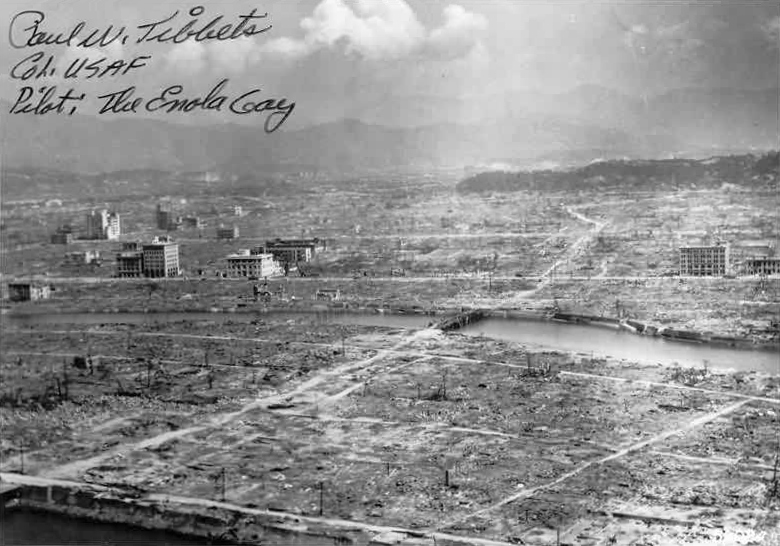 The most spectacular episode of Truman’s presidency will never be forgotten, but will be forever linked to his name: the atomic bombings of Hiroshima on August 6, 1945, and of Nagasaki three days later. Probably around two hundred thousand persons were killed in the attacks and through radiation poisoning; the vast majority were civilians, including several thousand Korean workers. Twelve U.S. Navy fliers incarcerated in a Hiroshima jail were also among the dead.
The most spectacular episode of Truman’s presidency will never be forgotten, but will be forever linked to his name: the atomic bombings of Hiroshima on August 6, 1945, and of Nagasaki three days later. Probably around two hundred thousand persons were killed in the attacks and through radiation poisoning; the vast majority were civilians, including several thousand Korean workers. Twelve U.S. Navy fliers incarcerated in a Hiroshima jail were also among the dead.Great controversy has always surrounded the bombings. One thing Truman insisted on from the start: The decision to use the bombs, and the responsibility it entailed, was his. Over the years, he gave different, and contradictory, grounds for his decision. Sometimes he implied that he had acted simply out of revenge. To a clergyman who criticized him, Truman responded, testily:
Nobody is more disturbed over the use of Atomic bombs than I am but I was greatly disturbed over the unwarranted attack by the Japanese on Pearl Harbor and their murder of our prisoners of war. The only language they seem to understand is the one we have been using to bombard them.
Such reasoning will not impress anyone who fails to see how the brutality of the Japanese military could justify deadly retaliation against innocent men, women, and children. Truman doubtless was aware of this, so from time to time he advanced other pretexts. On August 9, 1945, he stated: "The world will note that the first atomic bomb was dropped on Hiroshima, a military base. That was because we wished in this first attack to avoid, insofar as possible, the killing of civilians."
This, however, is absurd. Pearl Harbor was a military base. Hiroshima was a city, inhabited by some three hundred thousand people, which contained military elements. In any case, since the harbor was mined and the U.S. Navy and Air Force were in control of the waters around Japan, whatever troops were stationed in Hiroshima had been effectively neutralized.
Read the rest






5 comments:
"The world will note that the first atomic bomb was dropped on Hiroshima.
___________________
Jessica
Payday Loan online in 24hours
Now that's just silly. Bombing a country at war with us is not a war crime. Truman's decision saved lives. Saying that the bomb should not have been dropped is simply advocating for a greater loss of life.
JohnJ, the idea that Truman's decision to drop the bomb saved lives is a myth. The figure bandied about is "half a million" troops would have died in an assault on Japan. This is ludicrous, with most conclusions being a few thousand dead (the "worst-case" scenario involved 46,000). Besides, as noted in the article, Hiroshima was a city, not a military base. The military installations there were in the the outlying parts of the city, and the bomb was dropped in the center. And besides that, it is now well known that Japan was trying to find a way to surrender, but was hung up with the idea of "unconditional" surrender (they wanted the emperor to retain his position, which he ultimately did anyways).
In other words, it was mass murder.
When the invasion of Japan was first planned, the estimate of US casualties was relatively low. General MacArthur was anxious to invade and had his planners promote artificially low casualty estimates. The Navy leaders were skeptical and only tentatively signed on to this plan, just as long as the invasion picture did not deteriorate. It did.
Before the first of the Atomic bombs was dropped, the Navy was backing out of the invasion. There was a massive buildup of troops that had been shifted to the invasion area. Moreover, the estimated number of planes available to fly Kamikaze strikes increased by a factor of four from Spring to Summer of 1945.
The logical alternative now was to starve out the population. The Japanese leadership realized this imminent threat by March 1945. Right after the surrender did occur, those preparing for occupation necesseties estimated that 10 million Japanese were in danger of starvation. Good thing the war ended when it did.
Post a Comment